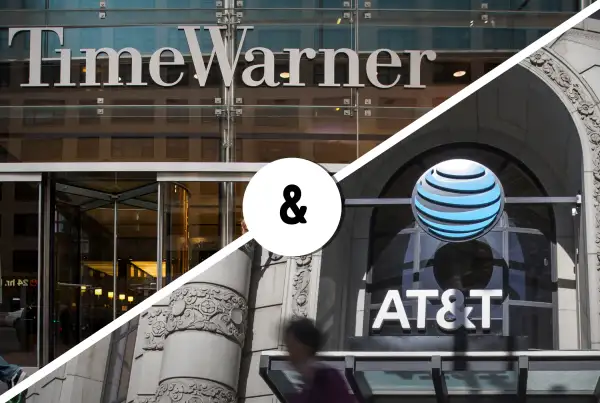3 Kinds of Big Business Mergers That Have Hurt Consumers

Fewer choices, higher prices. In a nutshell, that's what consumers have come to expect from corporate megamergers—including what looks like the latest one, in which AT&T has agreed to buy Time Warner.
The idea that such mergers benefit investors and executives while negatively impacting consumers is nothing new. Back in 2004, Bloomberg commissioned a survey gathering consumers' perspective on 28 big companies involved in mergers over a five-year span. The conclusion: "Customers were significantly less satisfied on average even two years after the deals closed than they were before."
Of course, companies generally say that mergers will yield positive results for consumers, in terms of increasing efficiencies and giving companies a theoretical ability to lower prices for customers. But things don't seem to work out this way. “Merging companies always say that they’ll save money and bring down prices,” Albert Foer, president of the American Antitrust Institute, explained to TIME's Rana Foroohar in a 2014 column. “But the reality is that they often end up with monopoly power that allows them to exert incredible pressure in whatever way they like.”
If approved by regulators, the AT&T-Time Warner merger may not result in increased prices—at least not immediately—but raises serious net neutrality concerns and could result in worse service for customers. As Fortune explained, once AT&T and Time Warner are essentially the same company, "AT&T might be tempted to give its broadband customers lower-quality streams of, say, television programs owned by Time Warner competitors."
For some proof that consumers tend to come out as big losers after big business mergers, here's a look at how they've played out recently in three industries.
Airlines
Consumer advocates argued vehemently that widespread consolidation among airlines would result in higher prices and worse service for travelers. But the mergers, including United-Continental and America-US Airways, were approved nonetheless.
Read Next: The Pathetic State of Airline Travel Today Was Predicted Long Ago
As predicted, the airline mergers led to a period in which airline service was cut, airfare and fees soared, and carriers have enjoyed record profits amid plummeting fuel prices. “Airline mergers and consolidations are taking a systemic toll that is bad for consumers,” Brent Bowen, dean of the College of Aviation at Embry-Riddle Aeronautical University, explained after a 2015 airline quality report was released, according to Bloomberg. “Performance by the airlines is slipping while they claimed this would make them better.”
More recently, airfare prices have retreated and many airlines have been expanding service, leading some to claim that the mergers have, in fact, been working to the benefit of consumers as billed. But these changes appear to be "driven far more by lower fuel prices than it is consolidation," the industry blog View from the Wing pointed out. "Fuel prices are masking what might otherwise have been some of the downsides of consolidation for consumers."
Pay TV-Internet Providers
Consumers regularly gripe that the cable-Internet world is rife with awful service and expensive pricing, and the most common reason cited that companies can get away with this state of affairs is that there's not enough competition in the marketplace. So it should come as no surprise that when competitors in the field combine, things get worse for consumers.
Read Next: 3 Industries That Desperately Need Customer Service Makeovers
For example, not long after AT&T purchased DirecTV, both providers raised prices essentially in perfect unison. In early 2016, Consumer Reports warned that a merged Charter and Time Warner Cable operation would give the new company "the power to stifle innovation and reduce competition," while also allowing it to "raise rates for consumers, and offer even poorer customer service than Charter and Time Warner already do, since there would be little incentive to invest in new technologies and staffing."
Sure enough, consumers have already been complaining that the new Charter Spectrum TV-phone-Internet service is jacking up prices. “Spectrum is proving the worst suspicions of consumers,” Jamie Court, president of the Santa Monica advocacy group Consumer Watchdog, said to the Los Angeles Times. “Bigger isn’t better when there’s only one broadband line coming into people’s houses.”
Health Insurers
Insurance companies use the standard playbook when arguing in favor of mergers, saying that a larger insurer can be more efficient and cost-effective, and that the resulting savings can—theoretically—be passed along to customers.
But guess what? Unsurprisingly, there is a tremendous body of research indicating that mergers result in "more market power for the big insurers and providers, at the expense of choice and value for consumers," George Slover, a senior policy counsel at the Consumers Union, explained.
"To be sure, there is substantial evidence that a large share of health care cost increases is caused by dominant providers charging high prices," Health Affairs noted in the summer of 2015. In other words, in the wake of mergers, insurers with a monopoly or near monopoly in the market obviously have more power to raise premiums and limit coverage—and that's exactly what they do.
Read Next: Here’s What’s Happened to Health Care Costs in America in the Obama Years
"There are a number of reasons to be skeptical of the idea that consolidated insurers will bargain down prices with providers," Health Affairs reported. "There is no compelling economic evidence that 'bilateral' monopoly produces better results for consumers; and even if a dominant payor succeeds in bargaining successfully with providers it has little incentive to pass along the savings to its policyholders."
